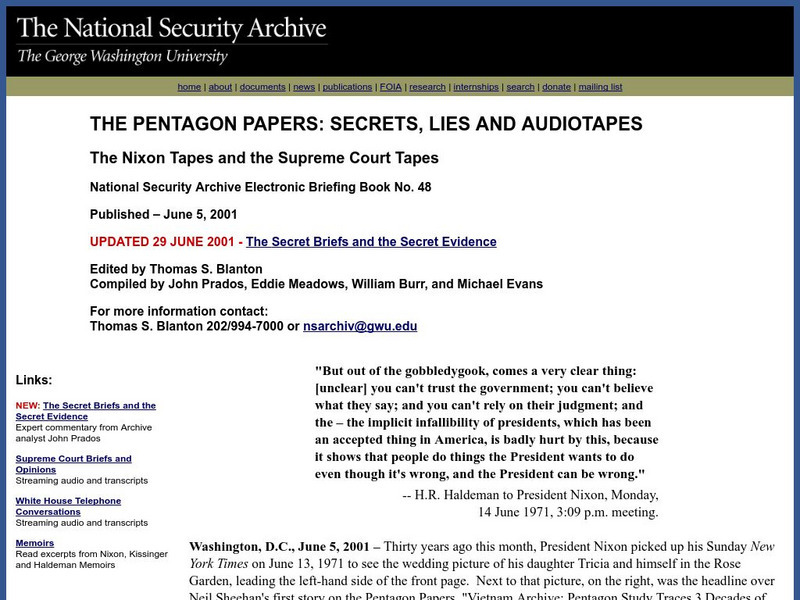Judicial Learning Center
Your 1st Amendment Rights
Why should classes care about the First Amendment? An engaging lesson serves as a powerful tool for answering just that. As all four cases in the lesson relate directly to freedom of expression in schools, young scholars explore the...
Judicial Learning Center
The Constitution and Rights
What's the right way to teach young historians about the Bill of Rights? Many an instructor has asked this question when pondering lesson plans over the US Constitution. The Constitution and Rights is a nifty resource that provides a...
Newspaper Association of America
Citizens Together: You and Your Newspaper
Not all news in a newspaper comes in the form of a traditional article; photographs, charts, and even editorial cartoons help spread important information, too. A civics-based unit describes the parts of the newspaper as tools for...
Newspaper Association of America
Using the Newspaper to Teach the Five Freedoms of the First Amendment
Of all the amendments found in The Bill of Rights, the First Amendment contains some of the most important freedoms for American citizens. A unit plan on the First Amendment features interactive lesson plans designed to teach about those...
American Bar Association
News Literacy Model Curriculum in Social Studies
Scholars investigate news literacy in the twenty-first century. They use technology, legal decisions, writings, and digital privacy to analyze the topic. Using what they learned, a group assignment looks into both the challenges and...
Facing History and Ourselves
Laws and the National Community
When it comes to the law, is justice always served? Teach scholars about how law sometimes enables prejudice of entire groups of people with a unit on World War II that includes a warm-up activity, analysis of primary sources,...
US Institute of Peace
Governance, Corruption and Conflict Simulation on Nepal
Can your class help the people of Nepal? Scholars take an in-depth look into the social injustices and struggling economy of a country in turmoil during a multi-day role-playing exercise. After reviewing information on the problems...
Annenberg Foundation
Student Voices
Whether it's an election year or not, a unit on voting patterns and political campaigns will awaken the civic pride in your high school citizens. Divided into six parts, the curriculum covers various facets of an election, including...
Newseum
Are You a Publisher?: Free Press and You
What kinds of media do your pupils use to read and publish information? After a discussion about what publishing means, and about the freedom of the press, class members interview one or two other people about their publishing habits....
Deliberating in a Democracy
Free and Independent Press
Students determine how free press principles can be compromised. For this global studies lesson plan, students read an article titled "Free and Independent Press." Students respond to discussion questions regarding the article.
Curated OER
Clear and Present Danger
Students assume identities of lawmakers, judges, writers, and protestors during times in American history when freedoms of speech and press were limited because country was on the brink of war or fighting one. Students use primary source...
Curated OER
Citizen Journalism
Learners examine the role of citizen journalism, freedom of the press, and the First Amendment. They analyze the results of an Internet survey, discuss the ethics of downloading copyrighted material on the Internet, and write a news story.
Curated OER
Thomas Jefferson on the Sedition Act
Young scholars research and cite arguments Jefferson used in objecting to the Sedition Act. They discuss Jefferson's opinion on how constitutional questions about the Sedition Act could be resolved.
Curated OER
War and the Media Press Freedom vs. Military Censorship
Learners analyze the relationship between war and media. In this media awareness instructional activity, students listen to their instructor present a lecture on freedom of the press and military censorship. Learners participate in an...
Curated OER
Writing Newspaper Articles
Students write newspaper articles regarding their service learning experiences. In this writing skills lesson, students review the writing process skills to develop high-quality articles. Students write articles regarding the their acts...
Curated OER
The First Amendment, What it Means and When Libel Comes in to Play
Students research three topics: The First Amendment, John Peter Zenger and his trial, and libel. In this journalism and libel lesson, students discuss things authority figures have done they disagree with and the anit-sedition law....
Curated OER
The First Amendment
In this government worksheet, students read the First Amendment to the United States Constitution before reading about the limitations of the laws. They answer 2 short answer questions about the freedoms, and write an essay on the back...
University of Groningen
American History: Documents: The Kentucky Resolution of 1799
The full text of the Kentucky Resolution of 1799, in which the General Assembly of the Commonwealth of Kentucky declares its opposition to the Alien and Sedition Acts of 1798.
University of Groningen
American History: Documents: The Virginia Resolution of 1798
This resource presents the full text of the Virginia Resolution of 1798, in which the General Assembly of the State of Virginia protests the enactment of the Alien and Sedition Acts of 1798.
US National Archives
Our Documents: The Alien and Sedition Acts (1798)
The Alien and Sedition Acts were passed by Congress in 1798 because of feared war with France. This engaging page gives you the opportunity to see a complete copy of the original document and also gives links to a typed transcript,...
US Department of State
America.gov: Edward R. Murrow [Pdf]
Highlights the life and career of broadcast journalist Edward R. Murrow. Examines his "This is London" reports during World War 11, the Senator McCarthy anti-Communist campaign in the 1950s, his critical treatment of migrant workers, and...
Lectric Law Library
'Lectric Law Library: New York Times v. United States
The 1971 leaking of the Pentagon Papers to the New York Times led to a Supreme Court case in which the government took the newspaper to court over publishing classified information about Vietnam War policy.
PBS
Pbs: Frontline: Freedom of the Press Around the World
Americans often take Freedom of the Press for granted, but this activity will remind students that other nations do not allow such liberal views of their press. Examine Russia, Iraq, Nigeria and other nations and evaluate the freedoms...
George Washington University
Nsa: The Pentagon Papers: Secrets, Lies, and Audiotapes
This site offers an extensive history of the 1971 Pentagon Papers case. Features include transcripts of President Nixon's tapes, White House phone conversations, memoirs, and other primary resources.




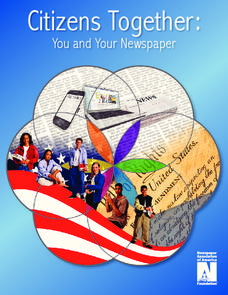







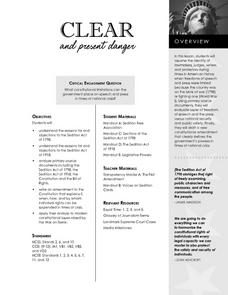






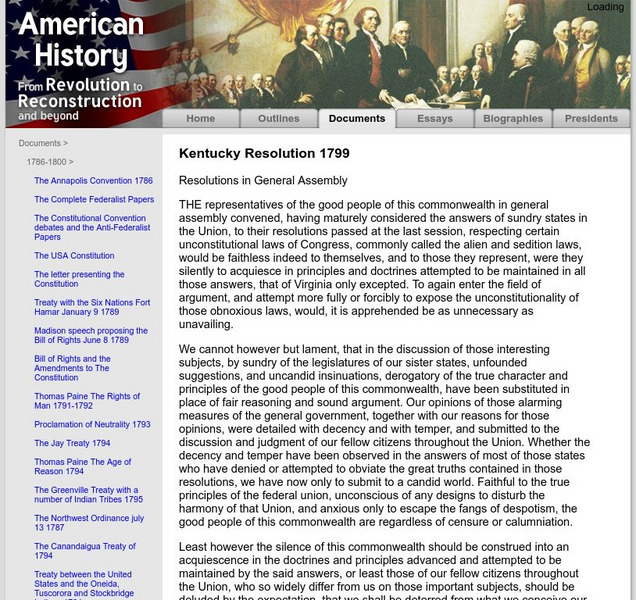
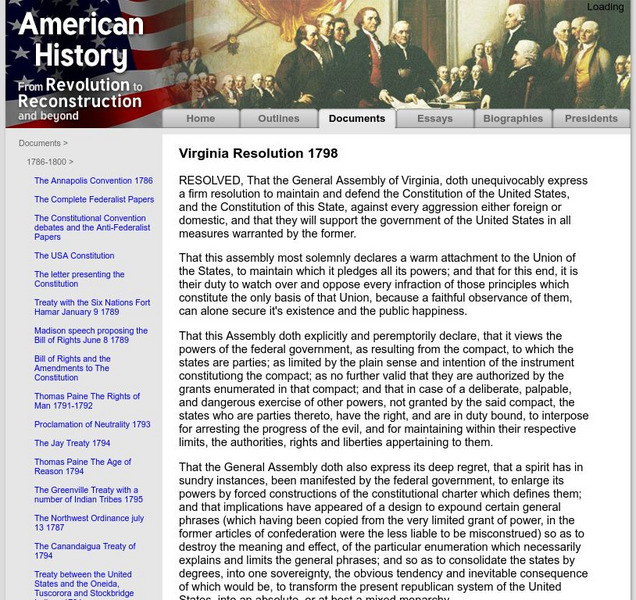

![America.gov: Edward R. Murrow [Pdf] Website America.gov: Edward R. Murrow [Pdf] Website](https://d15y2dacu3jp90.cloudfront.net/images/attachment_defaults/resource/large/FPO-knovation.png)

